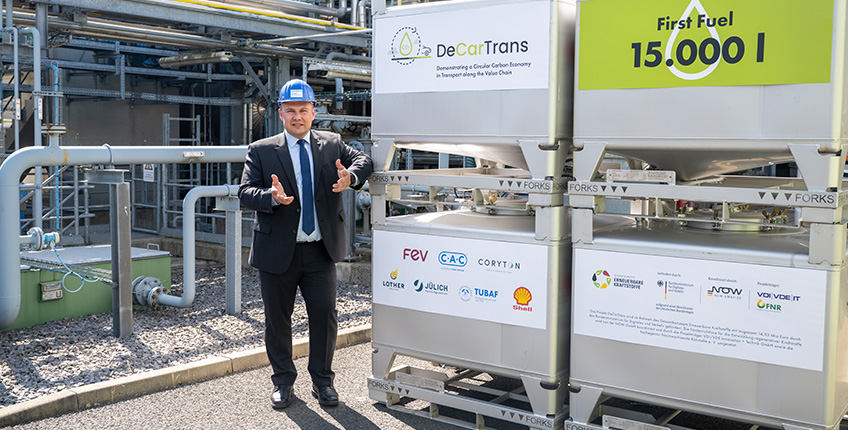The DeCarTrans project is further developing a process for producing synthetic fuel from methanol for the transport sector.
The consortium of research and industry plans to produce a total of 380,000 litres of green fuel (e-fuel) over the course of the next four years. The synthetic fuel will be produced from biogenic or regeneratively produced methanol in a demonstration facility in Freiberg, Saxony. On 25 May, the first 15,000 litres of synthetic fuel produced in the project were collected from the pilot facility.
DeCarTrans stands for “Demonstrating a Circular Carbon Economy in Transport along the Value Chain”. By producing the e-fuel over the planned four-year period, the project aims to demonstrate that up to 90 percent CO2 savings are possible with the help of a carbon cycle. Furthermore, the researchers at the TU Bergakademie Freiberg are planning to test different qualities of regeneratively produced methanol. The catalysts required are also being optimised at the Freiberg Chair of Reaction Engineering in order to make production even more efficient.
Continuous production
By 2026, 380,000 litres of fuel are to be produced, which will then be made available to the project partners for fuel tests as well as extensive motor vehicle tests. The large-scale test facility for synthetic fuel was constructed by CAC at the TU Bergakademie Freiberg in 2009 as the first and largest of its kind in Germany. Within the scope of several research projects, funded by the federal government, the Free State of Saxony and with CAC’s own funds, it was possible to continue development until 2023, patent the technology and prepare it for large-scale production. The DeCarTrans joint project now underway, funded by the BMDV, will make it possible to operate fuel synthesis in continuous use and provide fuels in sufficient quantities for demonstration purposes.
About the DeCarTrans research project
Besides the TU Bergakademie Freiberg and Chemieanlagenbau Chemnitz GmbH, the participating partners of the Demonstrating a Circular Carbon Economy in Transport Along the Value Chain (DeCarTrans) project include FEV Europe GmbH, Hermann Lother & Co. Mineralölhandelsgesellschaft mbH, Coryton Advanced Fuels Deutschland GmbH and Forschungszentrum Jülich GmbH. Additional companies from the automotive and mineral oil industries support the project as associated partners.
The DeCarTrans project is funded by the Federal Ministry for Digital and Transport (BMDV – Bundesministerium für Digitales und Verkehr) within the framework of the overall renewable fuels concept with a total of 14.93 million euros. The funding guideline for the development of renewable fuels is coordinated by NOW GmbH and implemented by the project management organisations VDI/VDE Innovation + Technik GmbH and Fachagentur Nachwachsende Rohstoffe e. V..
Image: TU Bergakademie Freiberg/D. Müller


